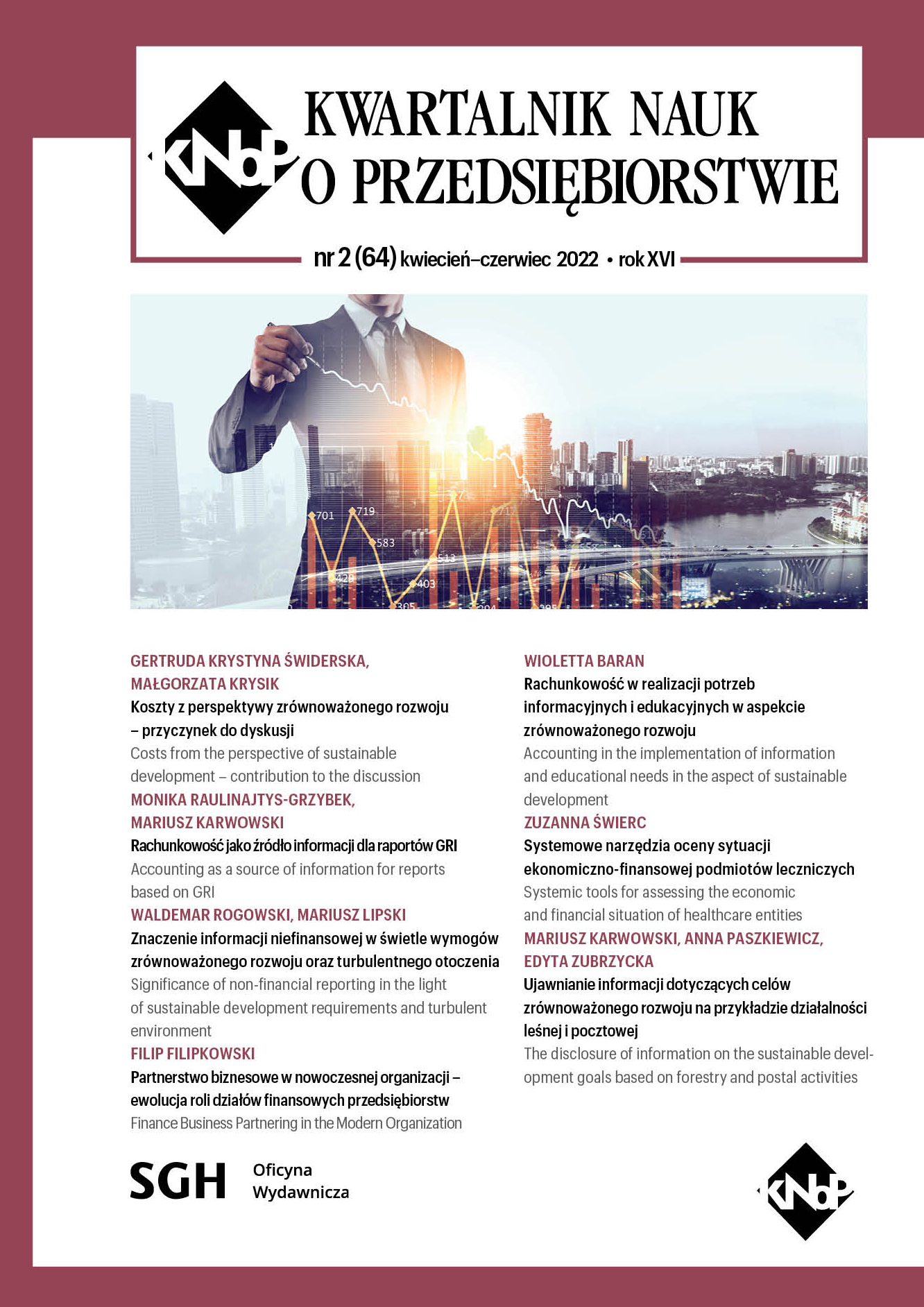Costs from the perspective of sustainable development – contribution to the discussion
Main Article Content
Abstract
Over the last 20 years, the number of companies reporting on their corporate social responsibility (CSR) that use GRI (Global Reporting Initiative) standards has increased 100‑fold. At the same time, carbon emissions have continued to rise, environmental damage has accelerated and social inequality has increased. It appears that the focus on reporting does not address the real need for changes in the thinking and behaviour of those who buy products and manage companies. Companies’ activities directed towards the design and manufacture of new sustainable products should be expected.
Sustainable development requires the use of product cost information as a measure of social and environmental impact (what is measured is managed). The lack of cradle-tocradle information on product costs translates into their prices, which do not contain signals that influence the decisions of product consumers. A product that has a worse environmental impact costs less than an equivalent that causes less harm. A higher cost for the planet does not translate into a higher price for the customer. The aim of this article is to present the possibility of using management accounting tools to support the process of designing and modifying sustainable products.
Downloads
Article Details
The author of the article declares that the submitted article does not infringe the copyrights of third parties. The author agrees to subject the article to the review procedure and to make editorial changes. The author transfers, free of charge, to SGH Publishing House the author's economic rights to the work in the fields of exploitation listed in the Article 50 of the Act of 4 February 1994 on Copyright and Related Rights – provided that the work has been accepted for publication and published.
SGH Publishing House holds economic copyrights to all content of the journal. Placing the text of the article in a repository, on the author's home page or on any other page is allowed as long as it does not involve obtaining economic benefits, and the text will be provided with source information (including the title, year, number and internet address of the journal).
References
Belz F., Peattie K. (2010), Sustainability Marketing, Wiley & Sons, West Sussex.
Cooper R., Montgomery J. (1985), Schrader Bellows, Harvard Business School Publishing, Boston.
Emery B. (2012), Sustainable Marketing, Pearson Education Limited, Edinburgh.
European Commission (2021), Special Eurobarometer 490. Report Climate Change.
Gregory Jeremy R., Montalbo Trisha M., Kirchain Randolph E. (2013), Analyzing uncertainty in a comparative life cycle assessment of hand drying systems, https://www.researchgate.net/publication/
257680103 (dostęp: 17.02.2022). Grzesik K. (2006), Wprowadzenie do oceny cyklu życia (LCA) – nowe techniki w ochronie środowiska, „Inżynieria środowiska”, t. 11, z. 1.
Joachimiak-Lechman K. (2014), Środowiskowa ocena cyklu życia (LCA) i rachunek kosztów cyklu życia (LCC). Aspekty porównawcze, „Ekonomia i środowisko”, 1 (48).
Kaplan R. S., Deere J. (1987), Component Works, Harvard Business School Publishing, Boston.
Kaplan R., Cooper R. (2002), Zarządzanie kosztami i efektywnością, Oficyna Ekonomiczna, Kraków.
Kronenberg J., Bergler T. (2010) (red.), Wyzwania zrównoważonego rozwoju w Polsce, Fundacja Sendzimira, Kraków,.
Łada M. (2016), Rachunkowość zarządcza. Od kosztów do wartości, Wydawnictwo Rachunkowość, Warszawa.
Martin D., Schouten J. (2012), Sustainable Marketing, Prentice Hall, New York.
Norma PN-EN ISO 14040 (2009), Zarządzanie środowiskowe. Ocena cyklu życia. Zasada i struktura, Polski Komitet Normalizacyjny, Warszawa.
Pucker K. P. (2021), Overselling Sustainability Reporting, Sustainable Business Practices, “Harvard Business Review”, https://hbr.org/2021/05/overselling-sustainability-reporting (dostęp:
30.01.2022)
Selech J., Kurczewski P. (2008), Ocena kosztów cyklu życia LCC, w: Zasady prośrodowiskowego projektowania obiektów technicznych dla potrzeb zarządzania ich cyklem życia, red. Kurczewski P.,
Lewandowska A. (2008), KMB DRUK, Poznań.
Stanton W., Etzel M., Walker B. (1994), Fundamentals of Marketing, McGraw-Hill, New York.
Świderska G. K. (2004) (red.), Obiektowy rachunek kosztów działań – koncepcja i wykorzystanie, Oficyna Wydawnicza SGH, Warszawa.
Trojanowski T. (2017), Projektowanie zrównoważonych produktów, „Zeszyty Naukowe Politechniki Śląskiej, Seria: Organizacja i zarządzanie”, z. 100, s. 516–518.
Zamagni A. (2012), Life cycle sustainability assessment, Springer-Verlag, s. 374.

